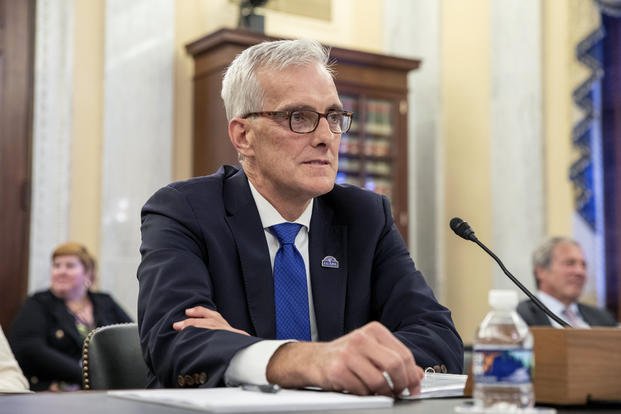The Department of Veterans Affairs may alter the rules for its community health care program, a system designed to help veterans see doctors outside of the VA system if they don’t have easy access to a VA medical facility, to stop that program’s growing spending from devouring its overall health care budget, according to VA Secretary Denis McDonough.
During a Senate hearing on the VA budget Tuesday, McDonough said the community care program now accounts for 33% of the VA's total health care demand, up from roughly 26% last year.
McDonough warned lawmakers last year that the growth was not sustainable, but said Tuesday he would consult with his new under secretary for health before formally proposing the move.
Read Next: Army Dumping Contractor Behind Troubled Tuition Assistance Platform
"[33% is] a high number, and that's the highest number yet of the three years of the Mission Act. Care overall, as you have seen in the budget, is growing. Care in the community as a portion of that is growing ... My hunch is that we should change access standards," McDonough said.
The 2018 VA Mission Act overhauled the department's private-sector health care programs for veterans, consolidating a number of civilian-care programs into a single community care program available to more veterans, with the costs covered by the department.
Under at least one of its predecessor programs, VA Choice, veterans were only eligible for community care if they lived more than 40 linear miles from a VA medical facility or were unable to get an appointment within 30 days.
But the Mission Act expanded the standards to include veterans who face drive times of at least 30 minutes to a primary or mental health appointment or 60 minutes for specialty care, or those who must wait 20 days or more to be seen for primary care or 28 days for specialty care.
McDonough said he would consult his new under secretary for health, Dr. Shereef Elnahal, once he is confirmed by the Senate as to whether changes are necessary.
"I'm not going to hoist him with my views. He happens to be a health care professional so we should probably have his views on this," McDonough said.
Kansas Sen. Jerry Moran, the committee's ranking Republican, introduced a bill last July that would give Congress the authority to determine eligibility thresholds for community care.
During Elnahal's confirmation hearing, Moran asked Elnahal what he thought of the access standards, which Moran described as "reasonable" and a "concrete measure" on which veterans "can rely in terms of accessing care."
"Wait time calculation, the access standard regulations I think are very clear," Moran said on April 27.
The Senate was to vote on Elnahal's nomination on May 25, but what was expected to be a swift approval was blocked by Sen. Rick Scott, R-Fla., who said he objected to what he said was President Joe Biden's failure to "appoint qualified individuals to serve in important roles."
Scott did not cite Elnahal specifically or detail why he thought Elnahal, a former Veterans Affairs assistant deputy under secretary for health and chief executive officer of University Hospital in Newark, New Jersey, was unqualified.
The VA has not had a permanent under secretary for health since 2017, when Dr. David Shulkin, who had held the position since 2015, was nominated to be VA secretary.
In the three years since the Mission Act has been in effect, veterans have reported that they encounter problems getting referrals to community care. The decision to refer is supposed to be determined by a veteran and their doctor, but veterans have said that their requests are often denied by VA employees who are not members of their health teams.
An investigation by inewsource and USA Today in November found that VA administrators have overruled doctors' referral recommendations to ensure that patients stay in the VA direct care system.
McDonough addressed the investigation during a hearing in December, saying the findings were not true.
"To suggest that by design we're breaking the law is an overstatement," McDonough said.
Nonetheless, McDonough said VA must do something to ensure that the community care budget does not continue expanding at its current rate. The VA's $301 billion fiscal 2023 budget request includes $99.1 billion for medical services, including $28.5 billion for community care, according to budget documents.
"What we know is demand for health care over the course of the Mission Act has increased. It has increased more intensively for care in the community," McDonough said.
McDonough said the department would seek input from Congress and the public using the federal regulatory process before changing the standards.
The House Appropriations kicks off deliberations on the VA funding bill Wednesday. The Senate Appropriations Committee has not released a timeline for introducing its version of the bill.
– Patricia Kime can be reached at Patricia.Kime@Military.com. Follow her on Twitter @patriciakime.
Related: Thousands of Ineligible Medical Providers Are Enrolled in the VA's Community Care Program












